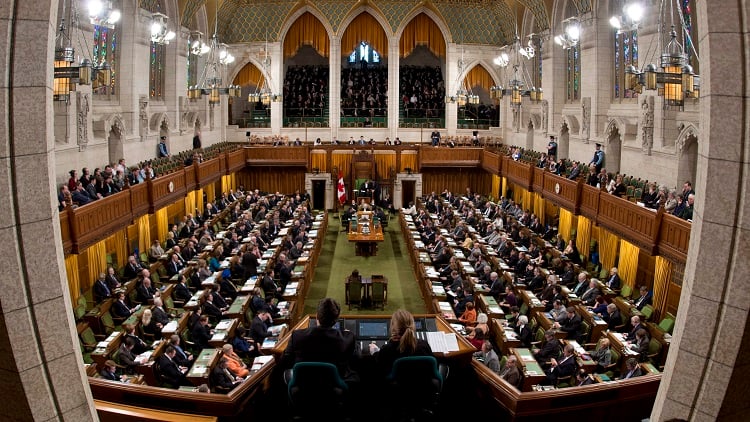The budget debate we didn’t have last week
Joe Oliver avoids Parliament
Federal Finance Minister Joe Oliver (right) stands with Dan Kelly, President of the Canadian Federation of Independent Business (CFIB) as he announces the sovernment’s new Small Business Job Credit initiative during an availability at a flooring shop in Toronto on Thursday, September 11 2014. Oliver says employment insurance premiums will be cut, reducing EI payroll taxes by nearly 15 per cent and saving businesses more than $550 million over the next two years. THE CANADIAN PRESS/Chris Young
Share

Finance Minister Joe Oliver presented the federal government’s fall economic update unchallenged to a paying audience in Toronto last Wednesday. If you’d been wagering on when Oliver would present the fall update and you had a copy of the House calendar handy, you pretty much had a 50/50 chance of guessing which week he’d pick—either the week the House wasn’t sitting in October or the week the House wasn’t sitting in November. Between the week starting Sept. 15 and the week ending Dec. 12, those are the only two weeks this fall when the House wasn’t scheduled to be sitting and so, if recent precedent held, one of those weeks would see the finance minister appear somewhere other than Ottawa to discuss the state of the federal government’s finances, that which the House of Commons is, perhaps above all else, charged with scrutinizing.
In the grand scheme, this might seem a small thing. The tradition of a fall economic update only goes back to 1994. But it was a tradition as it should be: the finance minister appearing, most often, before a committee of MPs to make his presentation and then take questions. That’s how things are supposed to be done. At least so long as you presume that we maintain a Parliament as our primary forum for accountability and scrutiny, charged with representing us and pursuing our best interests. If you presume that much, then the idea that the finance minister would avoid it to make a presentation on the allocation of our tax dollars seems a tad insulting.
But that’s merely the principle of the matter. What about the facts of the situation?
Shortly after Mr. Oliver was done with his presentation—the House of Commons is a nice room and all, but you can’t get photos taken with families and children in the House—our Stephen Gordon hung a fairly large asterisk on the finance minister’s numbers: if a Liberal or NDP or even future Conservative government doesn’t fulfill the current government’s commitments to austerity. No austerity, no surpluses. As Stephen and I discussed on the podcast this weekend, this is no small thing.
But the House of Commons wasn’t the scene of any such discussion last week.
The Office of the Parliamentary Budget Officer has been stymied in its attempts to conduct a full analysis of the government’s budget cuts—it has been two years now since NDP leader Thomas Mulcair requested such an analysis and the matter may yet return to the court. Perhaps some MP could have asked Oliver about how good we should feel about the billions of dollars the government has cut (or is cutting) without such an analysis. What precisely have we lost in exchange for reduced taxes?
Beyond the cuts this government has committed to, what about the billions of dollars—$7 billion last year, $11 billion the year before—that have been approved by Parliament, but then gone unspent by the federal government?
What, ask Scott Clark and Peter DeVries, about the use of an EI surplus and asset sales to show a surplus in the next two fiscal years?
Why is the department of Aboriginal affairs, as the Canadian Press reported last week, shifting money around to cover a shortfall in social and educational funding?
Is the defence department as beleaguered as Michael Den Tandt suggests?
Is the federal government, as Jack Mintz suggests, low-balling the likely future price of oil?
For that matter, why is it imperative that the federal budget be balanced by 2015? Would the country be better off if the federal government ran a deficit to pursue additional investments or tax reductions?
All of that might’ve made for at least an interesting couple of hours at the finance committee. Presuming, of course, that we could expect our parliamentary committee hearings to be useful and independent forums for meaningful discussion, and not, as they can be, stage-managed affairs that feature some amount of time reserved for the minister to take questions from his parliamentary secretary or some similarly compliant colleague.